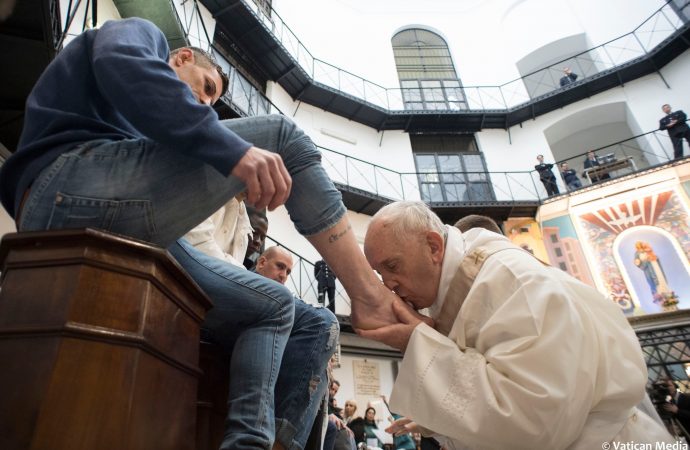Speaking to some 250,000 young people on Thursday, Pope Francis thanked them for the efforts they made to be a part of a Vatican-sponsored gathering taking place in Panama. On Friday, he’ll have a day of recollection, going to those who, due to their crimes, cannot take part in the event.
For the first time since the event was created by St. John Paul II in 1986, the pope will listen to the confession of a group of inmates during World Youth Day,. He is visiting the juvenile detention center of Pecora, about 15 miles from the country’s capital, on Friday. Later that day, he will lead thousands in the prayer of the Way of the Cross.
During the past six years, he’s visited a prison every time he has travelled to Latin America, proving that the predilection he had as a cardinal to visit jails during Holy Week is a core part of his ministry for Francis.
More than once, he said that when he goes into a jail, he cannot avoid thinking that he got lucky: Had his life been different, it could have been him behind bars, asking himself “why them and not me?”
Francis’s decision to visit prisons with certain regularity is not a novelty for a pope, and it’s rooted in the Gospel: “I was imprisoned and you visited me.”
During his many visits, the Argentine pontiff not only sought to bring comfort to those imprisoned, but also advocated for prison reform, speaking against overpopulation and lack of rehabilitation and integration programs.
He’s also been outspoken not only against the death penalty - actually changing the Catechism of the Catholic Church to make it clear that it’s always inadmisible - but against life-sentences, describing them as “hidden death penalty,” as the inmates have no hope of a second chance.
Speaking at Casal del Marmo, a Roman juvenile detention center during the first Holy Thursday of his pontificate, Francis urged the inmates to “Press on! Don’t let yourselves be robbed of hope. Understood?”
As the closing act of a jam-packed 44 hours in Bolivia, Pope Francis visited a notorious detention center called Palmasola, known as one of the world’s most overcrowded and dangerous prisons, leading the inmates in prayer.
“You may be asking yourselves: “Who is this man standing before us?” Francis told them. “The man standing before you is a man who has experienced forgiveness. A man who was, and is, saved from his many sins.”
He told them that he had little more to offer, but that he wanted to share “what he had,” which is “Jesus Christ, the mercy of the Father.”
“If there are times when you experience sadness, depression, negative feelings, I would ask you to look at Christ crucified,” Francis told them.
“He died for us, for me, so that he could stretch out us his hand and lift us up. Talk to the priests who come here, talk to them! Jesus wants to help you get up, always.”
In 2015, when he visited the United States, he went to the Curram-Fromhold prison, in the outskirts of Philadelphia, where he denounced that it’s “painful to note” that some prison systems don’t favor the reintegration of the inmates.
Months later, during his visit to Mexico in Feb. 2016, the pontiff went to Cereso 3, a prison in Ciudad Juarez. There, he said that “We have lost several decades thinking and believing that everything is solved by isolating, separating, imprisoning, removing the problems from above, believing that these measures truly solve the problems.”
The examples of Francis paying special attention to those deprived of their freedom abound: One of the final major events of the 2016 Jubilee of Mercy was a Mass for some 1,000 inmates from 12 countries in Rome’s St. Peter’s Basilica.
During his visit to Chile, the pope approached the reality of female prisons, where many of the inmates live with their children. Surrounded by some 1,200 inmates, Francis said that “a human sentence without future it is torture, all the pain has to have a horizon, the horizon to reinsert itself and prepare for life outside. “
He reminded the inmates “that being deprived of freedom is not being deprived of dignity.”
In 2017, addressing inmates in a federal prison in Argentina through a video, Pope Francis said that serving time behind bars without any hope of eventually being reintegrated into society is not punishment but torture.
Francis congratulated the inmates of Argentina’s Ezeiza Federal Penitentiary who were attending university while in jail, and thanked all those involved in the project for helping those serving time for a “mistake they made” to reintegrate into society.
“Life, as you know, is a gift, but one that must be conquered every day,” Francis says in the video. “Life was gifted to us, but we must conquer it on every step of the way.”

